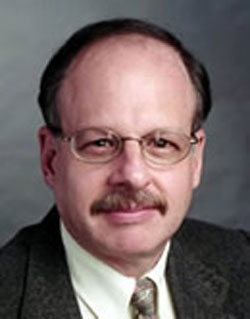
| Vol.
XIX No.
5 March / April 2007 |
| contents |
| Printable Version |
In Memoriam
Stephen M. Meyer
The following Memorial Resolution for Stephen M. Meyer was passed at the March 21, 2007 meeting of the MIT faculty.
We have the sad duty to report that on December 10, 2006 our friend and colleague, Stephen M. Meyer, died after a long and heroic battle with cancer. He was 54 years old.
Steve was raised on Long Island. He graduated from the State University of New York in Stony Brook in 1974, and then attended the University of Michigan, where he received his MA in 1976 and PhD in 1978. He was appointed assistant professor of political science at MIT in 1980, rising to the rank of full professor in 1990.
Steve Meyer’s first intellectual adventure concerned the causes of nuclear proliferation. He wrote a major book, The Dynamics of Nuclear Proliferation, and published important articles on arms control and verification. In the 1980s and early 1990s he was a leading academic expert on the Soviet military and Soviet defense policy. His writings on Soviet defense decision making, defense industries, and civil-military relations broke new ground in “pulling back the curtain” on the Soviet defense establishment. His publications in the 1980s on Soviet nuclear weapons operations and defense policy were considered the definitive open-source accounts prior to the end of the Cold War.
Steve Meyer’s expertise on the Soviet defense establishment attracted a large group of PhD students to MIT’s Defense and Arms Control Studies Program (now the Security Studies Program). His work also made him a leading consultant to the U.S. government on these issues, and the recipient of substantial public and private grants. With this grant support, and the assistance of his graduate students, he created the Soviet Security Studies Working Group. MIT became the leading program in the country for PhD students in Political Science to study Soviet defense policy. Many of these students have gone on to hold important positions in academia, government, and the private sector.
The collapse of the Soviet Union created an intellectual crisis for students of contemporary Russia from which many never fully recovered. Steve took advantage of the situation to change course substantially, turning his talents to the study of environmental policy and politics.
At the time of his death, Steve was in the midst of a project, funded by the National Science Foundation, which examined the capacity of local governments to effectively manage environmental problems by closely studying local wetlands regulation in Massachusetts.
Steve's research identified the economic and contextual factors that led some communities to adopt more stringent regulations than required by state law, and demonstrated that these regulations resulted in improved environmental outcomes.
Focusing on environmental policy allowed Steve to integrate his intellectual agenda with his own private life. Steve chaired and served on state and local commissions that attended to land use, conservation, and species protection. In 2005 he was awarded the Gov. Frances Sargent Conservation Award from the Massachusetts Division of Fisheries and Wildlife; he was named a “Conservation Hero” by the National Park Service in 2006.
Steve’s final book was End of the Wild, published by the MIT Press in late 2006. In this book, Steve argued that the earth had passed a tipping point at which incremental forces, such as sexual selection, no longer served as the driving force behind species selection and evolution. The driving force is now us – human beings. This has led to a rapid proliferation of weedy species and a crash in species diversity overall. In response to this sobering state of affairs, Steve laid out a cogent argument for why – from the broad perspective of the whole biosphere and the narrow perspective of human survival – human beings must manage even more intensely the biodiversity that remains.
Steve Meyer was a demanding scholar and inspiring teacher. Even when he shifted his attention away from security issues, he continued to teach his popular undergraduate class on American National Security Policy.
Steve’s shift of emphasis to environmental politics led him to create 17.32, Environmental Politics and Policy, which regularly earned him among the Institute’s highest teaching scores. Steve chaired the Committee on Curricula from 2001 to 2003 and was the driving intellectual force behind a revamping of the Political Science Department’s curriculum in the late 1990s. He was one of the founders of MIT’s Public Policy minor. As an organizer of the Burchard Scholars Program, he served as an impresario, bringing together faculty in the humanities, arts, and social sciences with a small, yet highly motivated group of undergraduates who shared interests in these areas.
For his dedication to undergraduate student life and learning at MIT, Steve was awarded the Arthur C. Smith Award in 2004.
Steve’s final adventure, his struggle with the cancer that took his life, was undertaken with the determination, curiosity, probing intelligence, clear thinking, and unflappable good humor that characterized everything he did.
As a scholar and a courageous human being, Steve was one of the best. His passing has left a significant hole in the heart of the Political Science Department and in the Institute at large.
Be it resolved:
That the faculty of the Massachusetts Institute of Technology, at its meeting of March 21, 2007, record its profound sense of loss on the death of our beloved colleague and friend, Stephen M. Meyer, and that our deepest sympathy be expressed to his family.
Respectfully submitted,
Donald L.M. Blackmer (emeritus)
Joshua Cohen
Judith Layzer
Richard J. Samuels
Charles Stewart III
| Back to top | |
| Send your comments |
| home this issue archives editorial board contact us faculty website |
